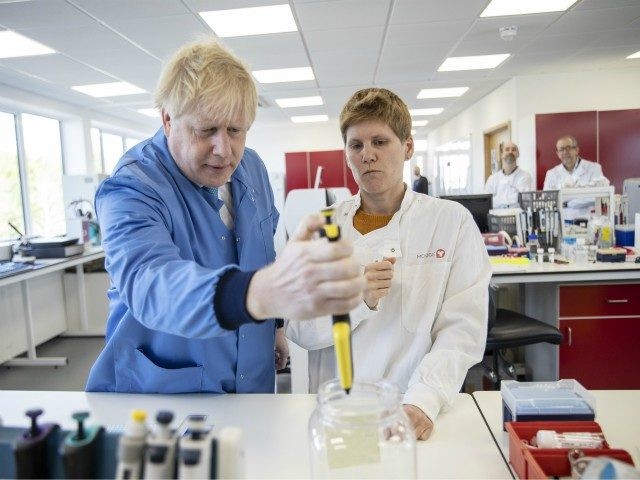The government is under increasing pressure to ramp up coronavirus testing after UK death tolls exceeded 2,000, and has now resorted to reaching out to private facilities in hopes they can work creatively to fill the gap left by inadequate state planning.
The United Kingdom saw her biggest single increase in fatalities with 563 people dying as of 5 pm, Tuesday, taking the official deaths from the Chinese virus to 2,352.
In response, Prime Minister Boris Johnson, who is self-isolating in Downing Street after having caught the virus, said that his government will “ramp up” testing, saying: “This is how we will unlock the coronavirus puzzle. This is how we will defeat it in the end.”
However, the government has come under criticism for failing to provide the promised “hundreds of thousands” of tests for National Health Service (NHS) doctors, nurses, and other key medical workers.
During Downing Street briefings the past few days, government ministers have struggled to respond to repeated questions of why testing was so low, with business secretary Alok Sharma declining to confirm on Wednesday if the government had plans to move to mass testing.
Cabinet minister Michael Gove had earlier blamed a shortage of standardised key chemicals, known as reagents, needed for the tests for the failure to screen medics. Public Health England said there is the capacity for just 3,000 screenings of hospital staff a day. Hospitals have revealed that they are begging vets for chemicals and are even producing their own so they can check their medics. If shortages were solved, NHS Providers said they could undertake 100,000 tests a day. Chemicals are not the only shortage, with some NHS labs only able to carry out a couple of tests a day because they do not have enough swabs.
The BBC reports that of the NHS’s 1.2 million employees, just 3,500 frontline staff in England and Wales have been tested. There have also been reports of medics being caught up in excessive bureaucracy and being turned away from drive-in coronavirus screening facilities because they did not have appointments. Several NHS staff who feared they had the Chinese virus had told The Times reports that temporary drive-in testing centres in Surrey and Wembley had refused to test them because they had not booked in advance, despite the facilities being described at times as empty.
Medics have expressed frustration at the lack of testing and as a result, having to self-isolate without knowing for certain if they have or had coronavirus. Around a quarter of doctors are off sick or self-isolating, putting a strain on hospitals trying to fight the deadly virus.
As a result, private laboratories are being engaged to undertake testing, moving away from centralised, standardised screening. A government source told The Times that it hoped to appeal to private industry in the same manner that resulted in the response to engineer and produce the much-needed ventilators. The newspaper adds that it raises questions as to why the government did not turn to industry support sooner.
Health Secretary Matt Hancock told industries using private labs: “I want industry and government to come together to build a UK diagnostic capability that hasn’t previously been seen. I am entirely open-minded about how we do this, but I am determined that it should happen.”
There are reportedly hundreds of smaller facilities in universities, research institutions, and commercial laboratories that could undertake testing. One British entrepreneur who has been running private tests for GPs in Oxfordshire, processing 100 tests a day, is calling for other labs to step in. Mike Fischer said in comments reported by The Times that other facilities could take on the work, and hopes that if 1,000 labs join his informal network, they could do 800,000 tests a day.
Mr Fischer, who hopes to increase the number of testing his lab conducts to 800 a day, said that initially there were issues with getting government-approved standard reagents, but that his “small and nimble” firm had “managed to work around them or find solutions”.

COMMENTS
Please let us know if you're having issues with commenting.